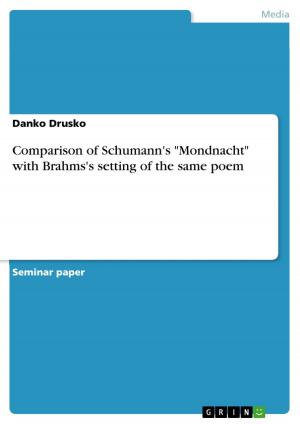You understand or you overstand? Eine Betrachtung der Sprache der Rastafari
Nonfiction, History, Americas, Caribbean & West Indies| Author: | Christin Franke | ISBN: | 9783668104952 |
| Publisher: | GRIN Verlag | Publication: | December 8, 2015 |
| Imprint: | GRIN Verlag | Language: | German |
| Author: | Christin Franke |
| ISBN: | 9783668104952 |
| Publisher: | GRIN Verlag |
| Publication: | December 8, 2015 |
| Imprint: | GRIN Verlag |
| Language: | German |
Masterarbeit aus dem Jahr 2015 im Fachbereich Kulturwissenschaften - Karibik, Note: 1,5, Europa-Universität Viadrina Frankfurt (Oder) (Sprachvergleich und Sprachgebrauch), Sprache: Deutsch, Abstract: Rastafarians have developed a group-specific vocabulary, a special language unique to the group, refered to below as 'Rasta-Talk'. By means of this particular language they convey their ideologies, beliefs and lifestyles. Simultaneously this special language symbolizes the refusal of the former colonial regime as well as the rejection of the lifestyle, language and the political system of the Western World, which they still see as oppressive. The differences among the groups - mansions - within the Rastafarian-Movement; Universal Rastafari, Nyabinghi, Bobo Ashanti and Twelve Tribes of Israel, and the way they communicate among themselves and to others, was a major part of my interest in the question: What is the symbolic value and current significance of Rasta-Talk for their speakers and in which sectors, public or private, this special language is used by who and in what way? The focus lies on the usage of the special language and the differences of the speech style of the respective groups. For this purpose I have conducted eight qualitative interviews with different members of the Rastafari-Movement in Jamaica, therefore the text is mainly based on empirical data. Subsequently eight categories were identified from the data corpus, answers from the interviewees were allocated to the aforementioned categories and comparatively considered, corresponding to a reductive content analysis. In summary it can be stated that the different definitions of Rastafari in general and the associated individuality of each Rastafarian, equates to the idiosyncratic use of Rasta-Talk. Any member of the movement is under their sole discretion to which extent they use Rasta-Talk if at all, in addition it is found that the usage can be emotionally conditioned and depends on the environment and listeners. The usage of Rasta-Talk no longer plays a dominant role for some Rastafari groups neither is it seen as a very important feature in identifying Rastafarians. Nevertheless Rasta-Talk is an important pillar of the Rastafarian culture having great historical and developmental significance. In conclusion it can be stated that Rasta-Talk is a special language which reflects the social situation and history of the descendants of the former African slaves. The group-specific vocabulary also has an impact on the Jamaican Creole language, as some terms have been retained and established as part of the Creole oral system exemplifying its characteristic features as a special languages.
Masterarbeit aus dem Jahr 2015 im Fachbereich Kulturwissenschaften - Karibik, Note: 1,5, Europa-Universität Viadrina Frankfurt (Oder) (Sprachvergleich und Sprachgebrauch), Sprache: Deutsch, Abstract: Rastafarians have developed a group-specific vocabulary, a special language unique to the group, refered to below as 'Rasta-Talk'. By means of this particular language they convey their ideologies, beliefs and lifestyles. Simultaneously this special language symbolizes the refusal of the former colonial regime as well as the rejection of the lifestyle, language and the political system of the Western World, which they still see as oppressive. The differences among the groups - mansions - within the Rastafarian-Movement; Universal Rastafari, Nyabinghi, Bobo Ashanti and Twelve Tribes of Israel, and the way they communicate among themselves and to others, was a major part of my interest in the question: What is the symbolic value and current significance of Rasta-Talk for their speakers and in which sectors, public or private, this special language is used by who and in what way? The focus lies on the usage of the special language and the differences of the speech style of the respective groups. For this purpose I have conducted eight qualitative interviews with different members of the Rastafari-Movement in Jamaica, therefore the text is mainly based on empirical data. Subsequently eight categories were identified from the data corpus, answers from the interviewees were allocated to the aforementioned categories and comparatively considered, corresponding to a reductive content analysis. In summary it can be stated that the different definitions of Rastafari in general and the associated individuality of each Rastafarian, equates to the idiosyncratic use of Rasta-Talk. Any member of the movement is under their sole discretion to which extent they use Rasta-Talk if at all, in addition it is found that the usage can be emotionally conditioned and depends on the environment and listeners. The usage of Rasta-Talk no longer plays a dominant role for some Rastafari groups neither is it seen as a very important feature in identifying Rastafarians. Nevertheless Rasta-Talk is an important pillar of the Rastafarian culture having great historical and developmental significance. In conclusion it can be stated that Rasta-Talk is a special language which reflects the social situation and history of the descendants of the former African slaves. The group-specific vocabulary also has an impact on the Jamaican Creole language, as some terms have been retained and established as part of the Creole oral system exemplifying its characteristic features as a special languages.















